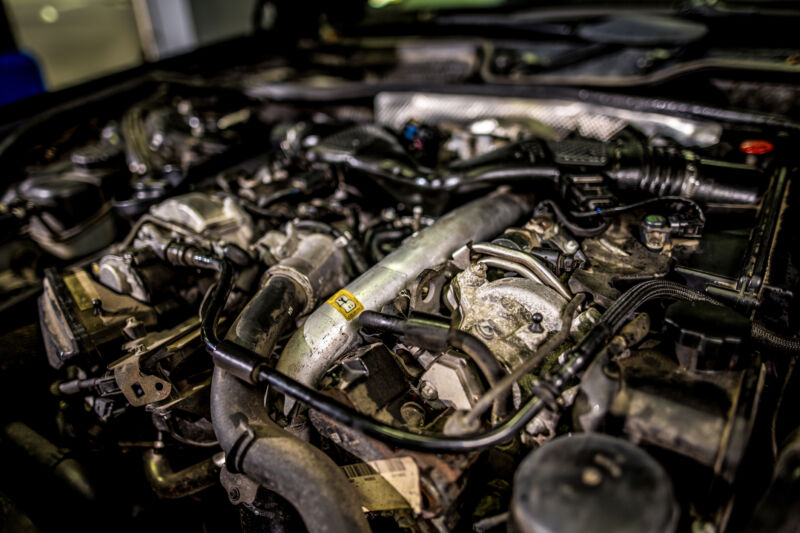
A workforce of engineers at the University of New South Wales (UNSW) in Sydney has figured out a way to run a diesel engine on a mix of diesel and hydrogen, drastically reducing its emissions.
Why do we even require a diesel-hydrogen hybrid engine when there are already lots of excellent electric autos readily available? EVs are undoubtedly fantastic for households, but they continue to never match major diesel engines’ functionality in some contexts, these kinds of as mining, lengthy-length transportation, electric power era, and agriculture.
At existing, there are 26,000 trains in the US that operate on diesel, and there are possibly hundreds of thousands of trucks, generators, and other market-quality devices that need diesel to provide the best possible functionality. It could possibly take many years for EV know-how to swap diesel engines in such industries. While it is easy for a normal man or woman to promote an aged vehicle and buy a new EV, these alterations arrive at a high price to industries.
So we’re probable to be trapped with diesel engines for a while. But what if there was a way to cut down the CO2 emissions from their current devices by 85 p.c?
This is what UNSW’s hydrogen-diesel hybrid engine know-how claims. The scientists assert that their modified diesel engine can run on 90 percent hydrogen with an improved performance of over 26 per cent. In a push launch, Shawn Kook, 1 of the authors of the review and professor at UNSW, stated, “We have shown that we can take those people present diesel engines and transform them into cleaner engines that burn off hydrogen fuel.”
He extra, “This new technological know-how noticeably lowers CO2 emissions from present diesel engines, so it could enjoy a huge section in generating our carbon footprint substantially smaller sized, specially in Australia with all our mining, agriculture, and other weighty industries where diesel engines are extensively utilised.”
A twin-gas procedure
A car powered by diesel has a diesel-injection device that releases fuel into the combustion chamber. The engine’s piston compresses the gasoline-air combine to superior stress and temperature, which causes it to ignite. This produces the tension that powers the engine.
Through this process, a diesel engine provides carbon dioxide and NOx (nitrogen oxides), which are dangerous to our setting. The researchers say that right mixing hydrogen with diesel in the combustion chamber would raise NOx air pollution. In buy to defeat this dilemma, they developed a hydrogen-diesel twin-gasoline process that uses a timed, significant-force hydrogen immediate-injection unit within a diesel motor that was by now equipped with a diesel-injection unit.
According to Kook and his group, the concentration of a gas—hydrogen, in this case—can be created to differ inside unique sections of the combustion chamber. These variants can have an impact on the chemical reactions and control the amount of NOx developed by the engine. The scientists employed the timing of the hydrogen injection to restrict NOx generation.
By working with hydrogen as 90 p.c of the gas, they were being ready to limit the engine’s CO2 exhaust to just 90 gm per kWh. This is 86 per cent a lot less carbon dioxide than a typical diesel engine would launch. In addition, NOx emissions ended up also identified to be lowered appreciably. “We have demonstrated in our technique that if you make it stratified—that is, in some spots there is far more hydrogen and in other people there is fewer hydrogen—then we can lower the NOx emissions under that of a pure diesel motor,” mentioned Kook.
Whilst it took the scientists 18 months to build their very first hybrid engine, they assert they can now transform any diesel motor design into a twin-fuel program within just a couple of months.
Hybrid engine types built uncomplicated
Common techniques of hydrogen output include the oxidation of hydrocarbons that guide to CO2 emissions. Nevertheless, if hydrogen is made using renewable vitality, it can be a substantially cleaner resource of energy than electrical power from the grid. Though there are nonetheless emissions connected with the use of diesel gas, that is a trade-off in opposition to the issues of recycling lithium batteries.
The vision at the rear of the hydrogen-diesel immediate-injection motor process is to give industries with a sensible option for their carbon emissions trouble. Mining providers that utilize a assortment of diesel-primarily based machines and equipment alone deliver up to 7 per cent of international greenhouse gas emissions. Powering the progress of these kinds of sectors with hydrogen gas could significantly improve the health and fitness of our world.
Kook and his colleagues have by now patented their hydrogen-diesel, immediate-injection twin-gas procedure, and they are arranging to bring it to market place within the upcoming 12 months or two.
Intercontinental Journal of Hydrogen Power, 2022. DOI: 10.1016/j.ijhydene.2022.08.149
Rupendra Brahambhatt is an seasoned journalist and filmmaker covering science and tradition information for news businesses and publications all over the planet.